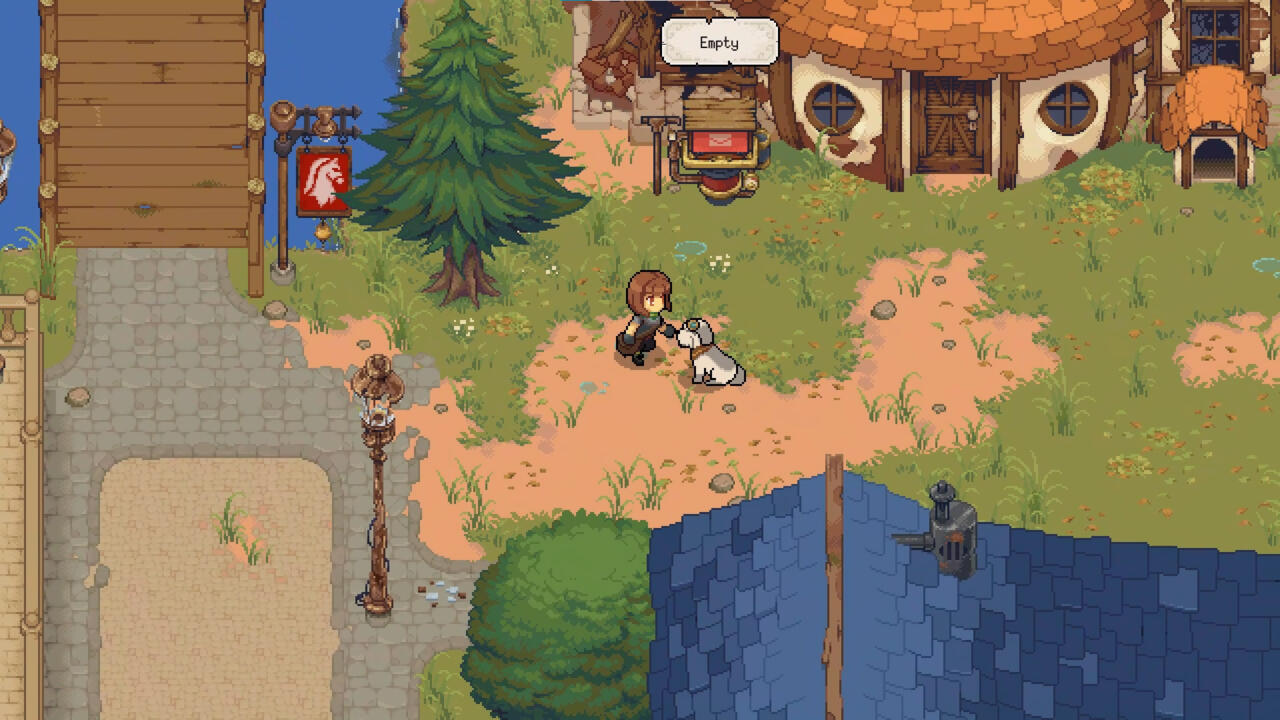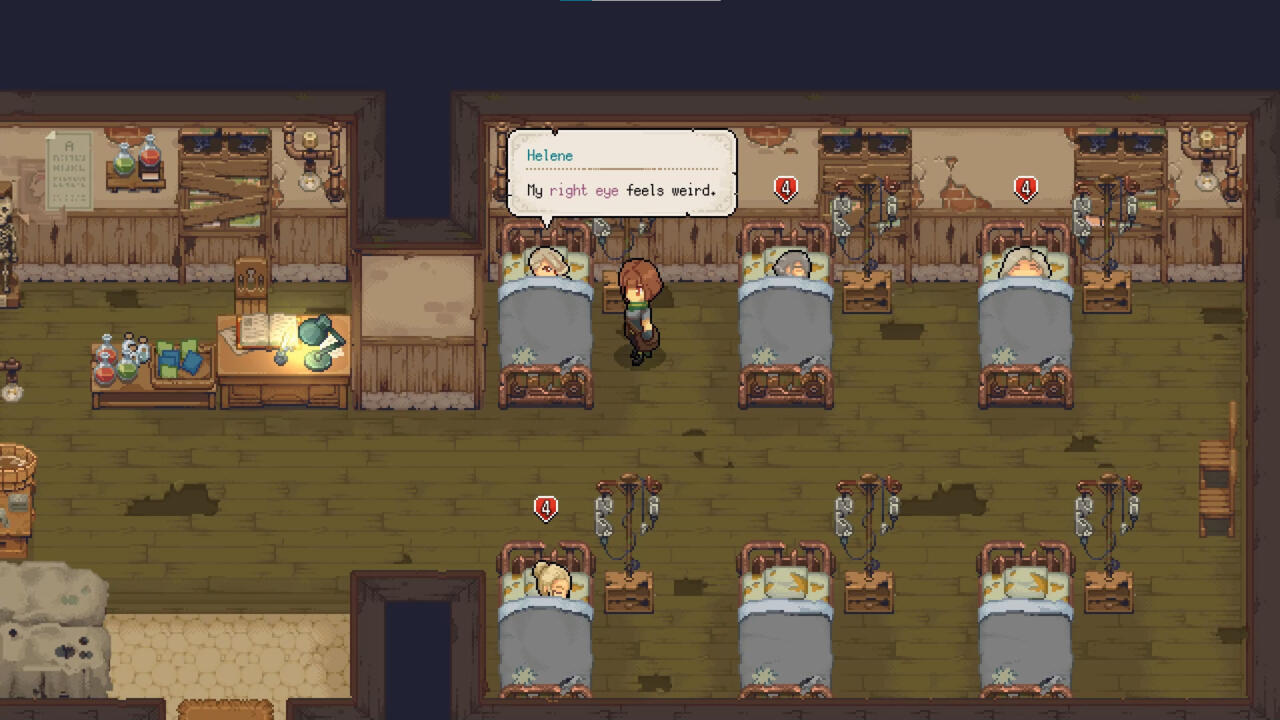We all know the story. You're overworked and in desperate need of a change when your grandfather coincidentally passes away and bestows upon you a cherished relic from your childhood: his farm. Of course, this rundown ranch is in desperate need of repairs, but luckily for you, there is a town full of interesting (and eligible) villagers eager to see you succeed.
We've seen some iteration of this story unfold in countless life-sim games, and to be fair, this formula is satisfying. However, what if, instead of inheriting a relative's legacy, you inherited years of resentment and distrust? What if, instead of a newfound farmer, you were a state-certified chemist, sent by the government to help an ailing town that has been burned by your kind before? This is the story Potion Permit sets up, and it's just one of the game's many fantastic qualities.

The latest game from Indonesian studio MassHive Media, Potion Permit is a life sim with RPG elements that tasks you with healing a community from both its ailments and its past trauma. You play a chemist sent from the capital to the village of Moonbury at the request of its mayor. You come to discover the reason the mayor sent for you is because his daughter is incredibly ill--so much so that not even the local doctor's methods are working on her. However, while the mayor and his wife are relieved upon your arrival to the sleepy, seaside town, they are among the only villagers who feel that way.
It turns out, you were not the first state chemist sent to Moonbury, and those before you did not leave a great impression. These prior chemists destroyed parts of the surrounding wilderness--rendering certain plant species extinct--the town collectively swore off chemists and their modern medicine. It's a compelling and original story for the genre, sending you on quite the quest: Make amends for the former chemists' mistakes and earn the town's trust.
There are several ways to do this, and they all come together to create Potion Permit's satisfying game loop. At the start of each day, you will be notified of any patients that have come to your clinic. If you have patients, you must first diagnose their illness via one of a few button-pressing minigames, then rush back to your home to brew up the correct potion to treat it. To brew a potion, you have to arrange ingredients--which take on the shape of tetris-like blocks--into a puzzle, with some limitations as to what kinds of ingredients you can use. Both the diagnosis and potion brewing games are fairly simple, but provide that sense of gameplay that makes them engaging rather than monotonous, a trap many life-sims can fall into. And although treating patients and earning a living is fairly straightforward, harvesting these ingredients is where the real fun comes in.
Rather than farming to earn your resources, Potion Permit sends you to the depths of the nearby woods, where you must forage, chop wood, mine stone, and slay monsters to find your crafting materials. In addition to the woods, there are two other locations you can eventually unlock once you have enough money, stone, wood, and a high-enough reputation. Your reputation rises not only through healing the town, but by finding remedies to the environmental damage previous chemists inflicted. While I am the type of life-sim player who find the most enjoyment in the social aspects of the game (you can catch me offering pizza to Shane far more often than you can find me in Stardew Valley's mines), the resource gathering and exploration in Potion Permit often had me wanting to leave the town and discover new plants, monsters, and meandering paths.

This isn't to say Potion Permit's social aspect isn't just as compelling. In fact, alongside its narrative and gorgeous, muted art style, it might be the most interesting thing about the game. The town of Moonbury is filled with villagers, all with their own unique personalities and struggles, and your kind-hearted chemist is more than willing to help them work through them. Each of the six romanceable characters--three women, three men--are well-written and tender, eliciting more than a few butterfly-in-my-stomach moments from me. Even better is once you enter a relationship with them, you can date them anytime, with these dates cycling between a few different outings.
I was also impressed by how much thought went into the characters who are not love interests. In most life and farm sims, these characters feel tertiary, and cutscenes featuring them are few and far between. In Potion Permit, however, I found some of the greatest stories stem from these characters and nearly every day I played there was some new development with them or the town. It makes Moonbury feel alive in a way many life-sim games seldom do. And even though each villager has their own unique schedule, you can ask your canine companion to lead you to them at any time, eliminating the need for you to keep a careful schedule of where they are. This is just one of the quality of life improvements Potion Permit makes to the genre that I hope we see implemented more often.
However, Potion Permit is not without its fair share of issues. There are a few downfalls with the game's relationships, both romantic and platonic. While most life sims present you with the challenge of discovering what gifts a character likes, in Potion Permit you can only gift Moon Cloves. While this does streamline and expedite the friend-making process, it feels impersonal. In addition, there were some friendships I was shocked to see did not evolve into romances--and this has less to do with me wanting to romance these villagers and more to do with some explicitly feeling like romance options. This includes Helene, the flirty casino owner who repeatedly asks you to date her, as well as the book-loving Lucke.
I also took issue with how the game presented certain mental health- and disability-related issues. Though I think Cassandra's story is handled with tact, I strongly dislike that Ottmar's journal entry calls him "a simple-minded dullard, despite his physical size," when he is clearly portrayed as mentally disabled. I also found Garrett's portrayal as a grumpy old man in a wheelchair to be a very tired trope. And although it took me some time to realize this, Dev and Dan are the same character, just with different personalities--a tricky disability to portray well. I think Potion Permit is ambitious in introducing these characters, but at times it fumbles in its portrayals.

These issues pale in comparison to the game's bugs, however. On Switch, I encountered several frame drops as well as strange instances of the game scanning over the town or flashing the inside of a building before playing a cutscene. There were a few instances where I checked the job board only to be met with text that read "reserved for text" or a similar placeholder message rather than the errands I could take on. In the menu, some categories continuously told me I had new items to examine, despite having already looked through them.
The most severe of all of these bugs, however, are found in the game's romance options. During my final interaction with Xiao prior to entering into a relationship with him, the game went black, forcing me to skip the cutscene and miss out on a tender tarot card reading. Another major bug occurred when I gave Matheo a Moon Brooch--the item used to initiate the romance path with a character. After giving him the item, the game scrolled all over town before teleporting me to another character, Leano, and sending me down the romance path with her, despite not even having her at a relationship level to even do so.
The bugs and the lack of certain romance options make the game feel rough in spots, and adding to that sensation is the underutilization of certain systems. Although the Trust system established early on is a fantastic addition to the game's narrative, after earning the town's trust I never lost it--even during a brief period where an event sows some discontent among villagers. Whereas upgrading your cauldron and clinic are essential, upgrading your house's size, adding a kitchen, and even decorating your home all feel like a waste of money and resources, with no real reward for doing so. As such, I didn't really bother with any of this until after the game's story had come to an end, and by that point there remained little incentive to do so.
Lastly, there is a serious lack of character customization and accessibility options. Hairstyles feel predominantly made for light-skinned characters, the town tailor offers next to nothing in terms of ways to change your appearance, and accessibility options are just about non-existent. This is particularly egregregious considering how often you play minigames in Portion Permit (some including button-mashing and precise timing), as well as how small the game's text is. Despite not having any visual impairment myself, even I was a bit frustrated by how small and thin the text was in handheld mode.
Despite all these issues, however, Potion Permit is one of my favorite games I've played this year as well as one of the best life sims in recent history, which is a massive testament to just how high its highs are. Coming to the game's end was bittersweet because of how much I adored my time in Moonbury--how much I was enamored of the art, gameplay, characters, world, and writing as a whole. More than anything, I long for a Potion Permit series. I believe it has the potential to proudly stand next to games like Stardew Valley, Harvest Moon, and Story of Seasons and, if it addresses some of its most glaring issues, could push the genre forward in meaningful ways.